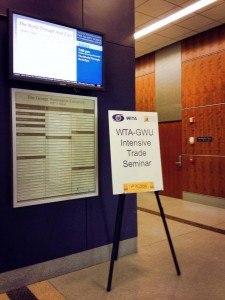I just came back from my first trade seminar experience in Washington, D.C. The WITA-GWU ITS, sponsored by the Washington International Trade Association (WITA) and the Elliot School of International Affairs at George Washington University, is a 2-Day intensive program on U.S. trade policy making with a series of briefings by U.S. policy makers, lawyers, academics, and discussions with various professionals in the policy making spectrum in D.C.

WITA-GWU Intensive Trade Seminar, the Elliot School of International Affairs, George Washington University (September 18-19, 2013)
I have to say that this was a formidable experience for someone who is deeply engaged in research on trade policies. I was interested in attending mostly because while my research is grounded in 2 years of on-site research in China, Japan, and South Korea, it lacks considerably in fieldwork in D.C. Professional policy venues are very much different in the aspects of content and networking atmosphere, and this event was no exception. One of the best things about the seminar for me as a researcher was being able to get some hands-on information about the trade policy making process inside the capital here in the U.S. The academic community in Boston and Cambridge often lacks the policy discussions of this sort, because much of the discussions are based on analytics rather than practicalities. Luckily, being able to easily travel to D.C. solves this issue.
While some of the details on the policy formation and structure were quite familiar through my studies in books and papers, the most notable topic was in the changing policy trends in U.S. trade policy. Intellectual Property Rights (IPR), for one, is a hot debated topic. As the U.S. economy grows more skewed towards services, the priorities and stakes in U.S. trade negotiations is likely to accompany policies underlining IPR. Global regulatory systems or standards are not ready yet, and this causes a lot of complexities amongst countries for negotiation at the moment. In the future, I am hoping to go further in depth on the cases of IPR in my subsequent research.
